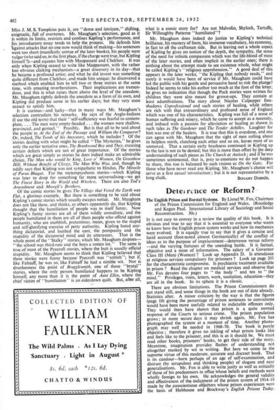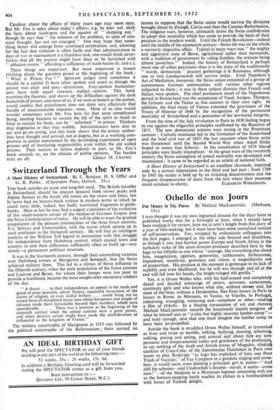Det ea rcnce or Reform? •
IT is not easy to convey in a review the quality of this book. It is obvious and true to say that it is essential to everyone who wants to know how the English prison system works and how its mechanics were evolved. It is equally true to say that it gives a concise and lucid account (foot-noted almost Germanically) of the conflict of ideas as to the purpose of imprisonment—deterrence versus reform —and the varying fortunes of the unending battle. It is factual, objective and a mine of information. The salary of a Governor Class HI (Men) (Women) ? Look up Appendix D. Is attendance at religious services compulsory for prisoners ? Look up page 203 for the characteristic compromise. Is psychiatric treatment available in prison ? Read the chapter on medical services and observe that Mr. Fox devotes four pages to " the body " and ten to " the mind." Privileges, visits, letters, work, sanitation, education—they are all in the book. In its sphere it is a classic.
There are obvious limitations. The Prison Commissioners do not stand still, and some things in the book are out of date already. Statistics alter. A minor criticism by the way is that the figures (page 10) giving the percentage of prison sentences to convictions would have been more Usefully related to indictable offences only. They would then have shown that prison is a quite normal response of the Courts to serious crime. The prison population grows ; in more secure days it may shrink again. Mr. Fox has photographed the system at a moment of time. Another photo- graph may well be needed" in 1960-70. The book is purely objective ; therefore it gives no- inkling of what prison looks like and feels like to the prisoner, and this is as it should be. We must read other books, prisoners' books, to get their side of the story. Meantime, imagination provides flashes of understanding not altogether masked by wit in writing. But here we come to the supreme virtue of this moderate, accurate and discreet book. That is its candour—born perhaps of an age of self-examination, and distrust (by scrupulous and thinking people) of slogans and easy generalisations. Mr. Fox is able to write justly as well as critically of those of his predecessors in officelvhose beliefs and methods were wholly foreign to his own. He acknowledges the general validity and effectiveness of the. indictment of the prison system of 1914-18 made by the conscientious objectors whose prison experiences were the basis of Hobhouse and Brockway's English Prisons Today. Candour about the affairs of thirty years ago may seem easy. But Mr. Fox is open about today's affairs ; e.g. he does not shirk the facts about wash-pots and the squalor of " slopping out," though he says that " the solution of the problem, in spite of con- stant thought, has not yet emerged." One may hope that some- thing better will emerge from continued cerebration, and, allowing for the fact that criticism is often facile and that administration in days of war or rearmament is a thankless task, one would think never- theless that all the prisons might have been or be furnished with " ablution rooms " affording a sufficiency of wash-basins (h. and c.).
These things are important. But more important is honest thinking about the question posed at the beginning of the book : " What is Prison For ? " Ignorant judges (and sometimes it should be a capital J) have often spoken and acted as though the answer was clear and easy—deterrence. Easy-spoken humanitar- ians have with equal sureness replied—reform. This book examines the theories, and shows up the difficulties against the dark backcloth of prison; and most of us, if we were as honest as the author, would confess that punishment does not deter very effectively that bundle of unaccountable impulses—man. Most of us also would wonder sometimes with Mr. Fox how far that same complicated being, needing freedom to sustain the life of the spirit as mucii as food to sustain his body, can be " reformed " in prison. Thinkers may dogmatise or they may wobble. Administrators have also to act and go on acting, and this book shows that the prison author- ities have thought and arrived, not at dogma, but at a working com- promise in action represented by the developing experiment of open prisons and of increasing responsibility even within the old walled prisons. Their success or failure depends in part, as Mr. Fox's book reminds us, on the climate of public opinion. The burden



































 Previous page
Previous page